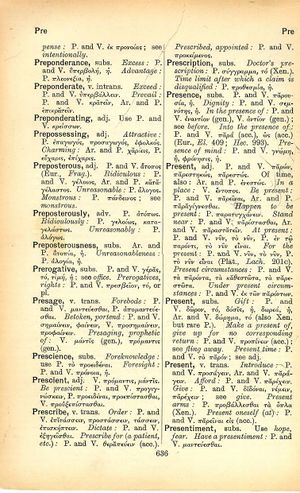present
ἀσκέειν, περὶ τὰ νουσήματα, δύο, ὠφελέειν, ἢ μὴ βλάπτειν → strive, with regard to diseases, for two things — to do good, or to do no harm | as to diseases, make a habit of two things — to help, or at least, to do no harm
English > Greek (Woodhouse)
adj.
P. and V. παρών, παρεστηκώς, παρεστώς.
Of time, also:Ar. and P. ἐνεστώς.
in a place: V. ἔντοπος.
be present: P. and V. παρεῖναι, Ar. and P. παραγίγνεσθαι.
happen to be present: P. παρατυγχάνειν.
stand near: P. and V. παρίστασθαι, Ar. and V. παραστατεῖν.
at present: P. and V. νῦν, τὸ νῦν, P. ἐν τῷ παρόντι, τὸ νῦν εἶναι.
for the present: P. and V. νῦν, τὸ νῦν, P. τὸ νῦν εἶναι (Plat., Lach. 201C).
present circumstances: P. and V. τὰ παρόντα, τὰ καθεστῶτα, τὰ παρεστῶτα.
under present circumstances: P. and V. ἐκ τῶν παρόντων.
subs.
gift: P. and V. δῶρον, τό, δόσις, ἡ, δωρεά, ἡ, Ar. and V. δώρημα, τό (also Xen. but rare P.).
make a present of, give up for no corresponding return: P. and V. προσπίνειν (acc.); see fling away.
present time: P. and V. τὸ παρόν; see adj.
v. trans.
introduce: P. and V. προσάγειν, Ar. and V. παράγειν.
give: P. and V. διδόναι, νέμειν, παρέχειν; see give.
present arms: P. προβάλλεσθαι τὰ ὅπλα (Xen.).
present oneself (at): P. and V. παρεῖναι εἰς (acc.).

